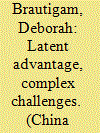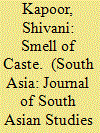| Srl | Item |
| 1 |
ID:
161814


|
|
|
|
|
| Summary/Abstract |
Industrial policy is back on the African policy agenda, with a number of countries following new strategies for rapid industrialization. None have done so more eagerly than Ethiopia. The present paper draws on Justin Yifu Lin's framework of New Structural Economics to assess Ethiopia's industrial policies and engagement in the leather industry. Making use of two rounds of semi-structured interviews (2012 and 2015) with all of the foreign firms and more than a dozen local firms in the leather sector, as well as other key stakeholders, it examines seven steps the government took to build the industrial policy: Create a high-level focus on the sector; make strategic use of international development partners; attract a “lead goose” (Chinese) in the footwear sector; build government capacity to support the sector; strengthen business associations; “shock-to-shape” upgrading; improve input supply. Ultimately, while government interventions have led to improvements across several steps of the value chain, the paper identifies a number of factors that have prevented the country from fully realizing a latent comparative advantage in the leather sector.
|
|
|
|
|
|
|
|
|
|
|
|
|
|
|
|
| 2 |
ID:
181683


|
|
|
|
|
| Summary/Abstract |
Leather was an important commodity for the British empire in terms of industrial production and scientific innovation. From the mid nineteenth century in India, the British sought to convert leatherwork into a scientific industry. Leather, however, also has a life in caste. The profound stench inherent to the process of leather tanning marks leather workers as polluted. Examining archival material and contemporary ethnography from Uttar Pradesh, this paper examines how the scientific colonial intervention in leatherwork was made complicated due to the sensorial politics of caste. The leather chemist, trained to impart scientific knowledge to leather workers, often failed to negotiate the caste-based sensorial nature of leatherwork, thereby allowing caste to limit the reach of modern science in the industry. Understanding this interaction between colonial science and leatherwork has important consequences for our understanding of the politics of caste and scientific knowledge in India.
|
|
|
|
|
|
|
|
|
|
|
|
|
|
|
|